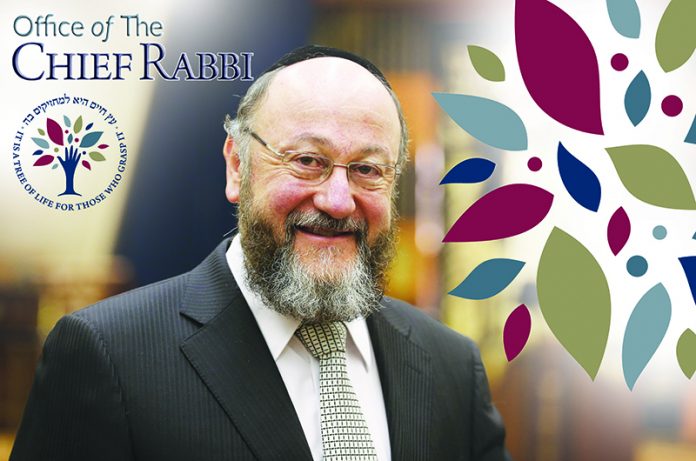
By David Saffer
With the High Holidays once again here it’s a time when Jews around the world reflect, consider challenges and look forward.
Chief Rabbi Ephraim Mirvis is no different and in his first in-depth interview with the Jewish Weekly he considers his Chief Rabbinate to date.
The 11th Chief Rabbi of the United Hebrew Congregations of the Commonwealth since the office was introduced in 1704, among many projects initiated, the Centre for Community Excellence (CCE) has been a mainstay project since its inception in 2014. And it is set to develop further.
Coupled with Shabbat UK, hard work has led to successes and far-reaching results.
CCE spearheads a range of ventures namely the Etz Chaim Project, Investing in Rebbetzens, Community Twinning and Rabbis for Communities.
Each benefits community life, lay leadership and synagogue relations.
“When I was a community Rabbi, creative programming was essential,” Chief Rabbi Mirvis, who was installed to the post on September 1, 2013, recalled.
“One of a number of young Rabbis I was mentoring in an outlying community came up with a brilliant idea for a Shabbat activity but the shul did not have the funds to bridge the £250 cost.
“I recalled his frustration and disappointment that his plan was on the launch pad and never happened. For the sake of a relatively small sum of money a community was not allowed to use the wings it had in order to fly and a creatively minded Rabbi was stopped in his tracks.
“A prime objective leading up to my commencement in office was to help those types of community Rabbis start fresh programmes.”
Through CCE, 470 new initiatives in over 100 shuls around the country have taken place.
“Amazing things are happening, it’s palpable, visible and something very real, and they are life shaping for participants.” enthused the Chief Rabbi, who together with his wife, Valerie, has visited communities the length and breadth of the United Kingdom.
Chief Rabbi Mirvis recalled a joint Shabbaton held by Solihull, Leicester, Newcastle and Sheffield in Bosworth that was particularly noteworthy three years ago.
“Shabbatons are not new but before CCE residential ones were out of reach for the vast majority of communities because of the cost of facilities,” he explained.
“When I heard community Rabbis had come together, who by themselves would not have enough people to populate a hotel, not only did we support them in terms of inspiration, ideas and funding, but Valerie and I went, celebrated with the communities and it was amazing.
“There was such excitement about Shabbat, Yiddishkeit and the capacity of a community to raise the bar, to punch above its weight.
“The event is symbolic of everything that has happened. These activities have given greater self belief and far more confidence to achieve. We have seen a transformation of the landscape of communities.”
Chief Rabbi Mirvis also praised regional events that are now the norm.
“Regional communities have come up with ideas we never thought of such as spending a Jewish day in London,” he explained.
“We think of spending a Jewish day in Paris or Amsterdam but never realised London could become a mecca for provincial Jews. Participants leave early on a Sunday and get back late at night. They have a kosher meal, visit a Jewish museum or area of Jewish interest, we provide an educator and they do some shopping in Golders Green.
“It’s a most incredible Jewish day, so simple yet so powerful, and has been repeated time and again with our assistance and input.”
As for Shabbat UK, like CCE, it has been a revelation since kicking off in 2014.
The Chief Rabbi has been a guest in Leeds and Manchester the past two years, but can the initiative move to another level?
Chief Rabbi Mirvis is in no doubt that it can.
“Shabbat UK would not have been the success it has been without CCE because the two have gone hand in hand,” he explained.
“We have been calling on communities to do something unprecedented and they have produced it, but CCE input is crucial in providing ideas, information and funding to allow communities to perform so spectacularly.
“In simple terms it’s about people attending communal meals, activities, a Havdalah concert, challah bakes and so on. But there is a separate level, engagement with Shabbat so people become more spiritually motivated. Its not just about attending an event, it’s feeling your Jewish roots, being proud of our Torah tradition.”
He added, “Shabbat UK has an amazingly powerful message that Torah values are cool. When we talk about a digital detox day, you could not have anything more relevant for the 21st century. Shabbat UK has made a great impact on British society in appreciating genuine values within challenging times.
“Each year we go up a notch and this year it will be a few notches. We have extra special activities that we will be announcing soon.
“The majority of Jews have engaged with Shabbat UK and that is quite a statement.
“A recently published Jewish policy research shows 44 per cent of Jews (census related) are not shul members so to have the majority engaging is a very significant number.
“Shabbat UK reaches out to people, encourages and is appealing. It sells itself because our Jewish souls appreciate what Shabbat is for us.”
Whilst Shabbat UK has been an undoubted success, Chief Rabbi Mirvis also noted that Shabbat-related activities had increased as a result, on an unprecedented scale.
“We have made it clear, if Shabbat UK was only about one Shabbat it would not be worth the effort, it’s primarily about the follow up,” he explained.
“Mill Hill is an outstanding example because directly as a result of Shabbat UK they have a Friday night monthly event for the community. Then there is Newcastle who had a mini-Shabbat UK. They repeated the challah bake, 80 members from the community of Gateshead made the long walk over the river to join them and they had an amazing Shabbat.
“Stanmore organised a Havdala Jam that attracted a huge variety of people and kids in Allerton, Liverpool launched an inter-generational programme after Shabbat over the winter months that was packed.
“These are some of the many different activities around the country Shabbat UK inspires.”
Chief Rabbi Mirvis turned his thoughts to CCE’s twinning programme.
“Twinning works brilliantly, its so simple yet powerful,” he enthused.
“When Pinner and Norwich spent a Shabbat together there was great community cohesion for a Jewish-centred experience in a historic city. Solihull and Sheffield have now done three joint events, Birmingham Central and Cheltenham have got together, and the trend continues.
“We are inundated with applications from communities for programmes.
“Ideas are passed around when they are successful. We send out ideas, booklets and best practice, this has worked for a community so why not try it?”
As for the CCE inspired Etz Chaim project, which has seen 160 young adults visit 54 communities run Shabbat and Yom Tov services alongside activities, the Chief Rabbi said it brought an “injection of yiddishkeit” to Shabbat.
Describing the Rebbetzen programme, which has staged leadership skills seminars and trips to Gibraltar and Rome, as an “amazing success”, he was similarly proud of a third regional leaders conference planned for 2018.
“Community leaders share dilemmas, challenges and successes,” the Chief Rabbi said.
“It has worked brilliantly, leaders are in contact and able to benefit in a very productive way.”
Regarding the visiting rabbi initiative, he commented, “It’s impossible for every community in the country to have a Rabbi because there are tiny pockets of Jews but every such group should have a person to turn to, someone to contact for pastoral purposes.
“Every Jewish soul is precious whether they are in Golders Green or somewhere in the regions, so this is project is making an impact.”
Summing up the overall programme, Chief Rabbi Mirvis is hugely optimistic.
“I believe in the strength of our communities,” he enthused. “I’ve seen wonderful commitment and the best thing about CCE is we don’t have a lot of convincing.
“We give ideas, show it can be done, people go for it and the rewards have been enormous.
“We have been able to provide the cream of Jewish leadership from around the world to be accessible to communities and it’s making a big difference.”
He added, “CCE is a hub, the go to place for communities and people to tell us about a great ideas. We connect people all the time, it has created an amazing collegiality amongst the Rabbinate, Rebbetzens and lay leadership of communities around the country.
“Our job is to point them in the right direction, offer advice, empower and give them the strength to do what they want to do.
“It is not just a question of paying expenses for a speaker, it’s a matter of professionalising the process. Ideas have to be clear and feedback is a fundamental process.
“We need to know what people think, was it worthwhile, what do they want to see happening in a Shul. It helps us see the impact on Shul. It also helps the Rabbi and lay leadership so they know they are doing the right thing for members.
“This new dimension to the office is about communities, Judaism, inspiring people and providing added quality to lives. That is the tone of our entire Chief Rabbinate, it is an indivisible part of everything that we are doing.
“We are here to provide services for everybody by creating a warm, friendly, inclusive community environment.
“A smile, a welcoming spirit, a statement that Shul is a home away from home where everyone can feel comfortable regardless of their religiosity.”
In terms of challenges that Jewish communities face, Chief Rabbi Mirvis believes in trying to accentuate the positives.
Take the topic of ‘shrinking communities’ in parts of the country.
“Demographic trends are a worldwide phenomena, its not just here in the UK,” he explained.
“London is different to smaller communities in the regions where by and large it’s about managing decline. The task is how best to cater for a community which is a shadow of what it used to be. How can we gain added self-confidence as opposed to talking ourselves down?
“What I tell communities when I see them is how vibrant they are, its amazing.
“Take Leeds, the city that I see today is spectacular. They have three active communities, a full infrastructure of organisations, education, welfare, something every community can be exceptionally proud of. But the mood in Leeds is quite sad, because they are a third of what they used to be, but my message is appreciate what you have got because it’s terrific.
“The same applies around the country, I’ve been enormously inspired what some tiny communities are doing. Look at Jersey, every Shabbat there is a wonderful community spirit.”
Then there is the thorny topic of ‘declining Shabbat morning congregations’ depending on where you are in the country.
“Whatever numbers you have, people want to be involved,” Chief Rabbi Mirvis said.
“In large communities there are individuals with enormous talent that are unknown to the community because we don’t tap into their ability, whereas in tiny communities everyone counts and I’ve seen incredible people who achieve a huge amount.”
He added, “There are many Shabbat programmes where people are engaged outside the conventional Shabbat morning.
“In my installation address, I hoped to see a transformation of houses of prayer into powerhouses of Jewish religious, social, educational and cultural excellence. That does not have to be in a Shul building. A community can excel in people’s homes, schools or Shul hall.
“The Shul building itself will always be a nucleus of activities but it needs to be far beyond a house of prayer and we are seeing many Synagogues today undergoing that transformation to become a vital Jewish centre of excellence.”
When it comes to an increasing number of Jewish school pupils not attending Shul on a Shabbat, as they used to, the Chief Rabbi is well aware of issues, but first praises the atmospheric nature of Jewish educational establishments.
“I’m hugely inspired when I meet children at Jewish schools,” he said.
“When kids sing in a choir at an assembly or at a Shabbat table at school on a Friday or at a model seder, I’m so moved and emotional because I see our future.
“Our community is achieving spectacularly in the realm of children’s education but we are also seeing a partial shift of emphasis from Shul to school.
“When you had under 30 per cent of Jewish children attending Jewish schools at the beginning of the 1990s, the time to express ones Jewishness was on Shabbat. Today just under 70 per cent Jewish children attend Jewish schools, which means they are in an immersive Jewish environment throughout the week.
“Unfortunately in some areas this means parents do not make a special effort to give their children a Jewish experience over Shabbat and that is a great pity.
“We are seeing an irony of far stronger Jewish education not being matched by higher levels of attendance by children in our Shuls.
“We speak about Shul, school, youth movements and cultural centres, and they are all crucially important, but nothing is more important than the Jewish home. When you have a strong, powerful home environment that is more important than any other influence.
“Where you have a committed home complemented by wonderful Shul services and activities, great education in schools and youth movements, that is the ultimate recipe for success. But if things are not strong Jewish wise in Jewish homes then it will be difficult for us.”
Shul participation is clearly a growing issue and to develop the next generations understanding and involvement, steps are afoot to enhance the Bnai Mitzvah programme.
“In addition to our barmitzvah boys knowing how to read a parshah and sing the haftorah they should also be familiar with davening,” the Chief Rabbi explained.
“What we have over all the years succeeded in doing is to get our boys to master one portion, and probably they will forget it in the course of time so on average they have invested 15 months in something they aren’t going to be using. What I’d prefer is that in addition to Torah reading and Haftorah, that our boys should learn how to lead a service.
“Our Bnai Mitzvah programme has started but will be formalised, although it won’t be imposed on communities because it depends on a boy and his attitude, but its equally important for girls.
“We want boys and girls of today to be familiar enough with our services whereby for the rest of their lives they can walk into any Shul in the world, hear where the Chazan is at, open a siddur and join in the service.”
Away from Shul matters, interfaith relations offer a special dimension to the Chief Rabbinate though there are issues.
“We have a very warm and healthy relationship with key faith leaders but sometimes don’t see those close relationships filtering down towards grass routes level, which is something I discussed with Pope Francis when I was at the Vatican,” Chief Rabbi Mirvis said.
“I raised with him the frustration we have that Nostra aetate (the Church’s relations with Judaism), which we recently celebrated the 50th anniversary of, was such a significant achievement between Judaism and Christianity, however in the vast majority of Catholic churches around the world they had not heard about it.
“Though Church dogma has changed, attitudes towards the Jews is taking a long time, but we also need to change some of our attitudes.”
Significant challenges indeed, but the Chief Rabbi is a leading player to educate.
Together with the Archbishop of Canterbury Justin Welby, they staged a daylong seminar at Lambeth Palace for 70 rabbis, bishops and priests last November.
A rabbi and corresponding church leader from 35 different areas attended the event.
“We discussed key issues that confront our faiths, those on which we see eye to eye and those in which we have challenging differences,” said the Chief Rabbi.
“The best part was the follow up, there have been so many activities of an interfaith nature within communities around the country thanks to this initiative.”
Chief Rabbi Mirvis is working on many fronts to benefit the Jewish communities around the UK and Commonwealth, so how does he gauge success?
“There is no scientific method, but overall, to its about what degree have we strengthened Jewish identity?” he explained
“There is no absolute definition, but for me, it means connecting with ones Jewish roots, pride in ones Judaism, ones Judaism being central to what one is not just living with but what one is living for, rooted in Jewish faith towards guaranteeing that our spiritual identity will be preserved for generations to come.
“Our history teaches us that the feeling of being Jewish can exist in one generation but there is no guarantee that it can be passed on to subsequent generations.
“The only way for us to guarantee the continuity of Judaism as a faith is through faith.
“I’m in a privileged position in my office to have the potential to change things for the better.
“We are doing things because it is of value and it brings us a huge amount of satisfaction to see that we are reshaping the way our communities are operating and there is a transformation of the landscape.”









